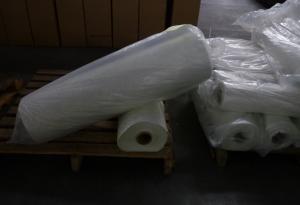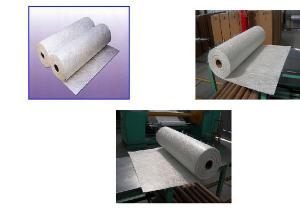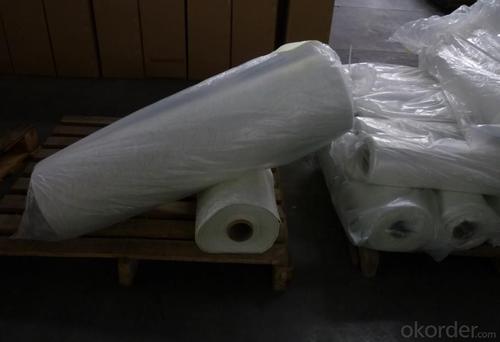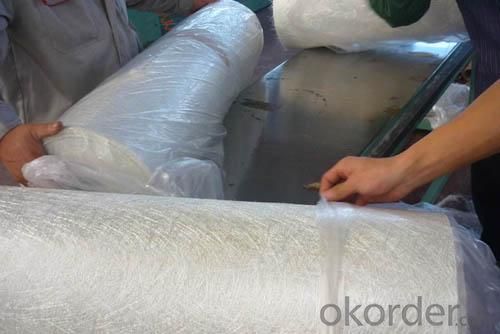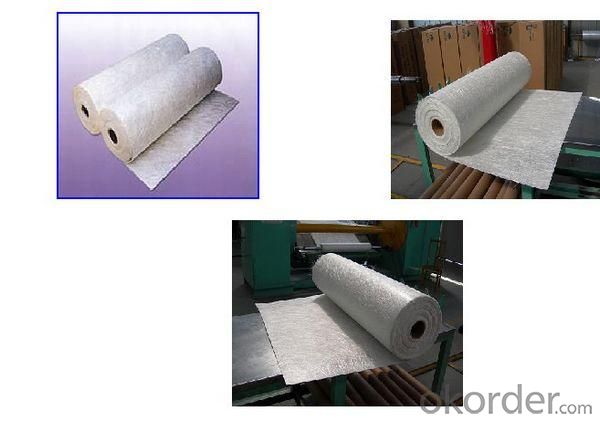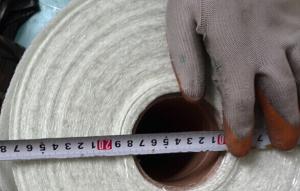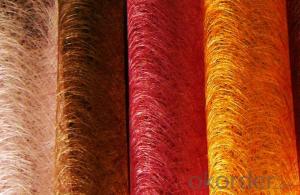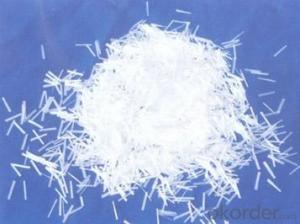Chopped Strand Mat Fiberglass Mat Tissue
- Loading Port:
- China Main Port
- Payment Terms:
- TT or LC
- Min Order Qty:
- 5Ton kg
- Supply Capability:
- 600TON PER MONTH kg/month
OKorder Service Pledge
OKorder Financial Service
You Might Also Like
Specifications of Chopped Strand Mat
chopped strands mat is powder or emulsion bonded by chopped E-glass or C-glass glass fiber.
Introduction of Chopped Strand Mat
Chopped stran mat is reinforced material vastly used in the moulding process of fiberglass by bands and in some mechanical forming technology as well.
Characteristics of Chopped Strand Mat
♦non-directional and even distribution, high mechanical kinetics
♦fine plating and fitting for complex shapes of moulders
♦soaked with resin, cutting freely, work simply
♦high strength of absorbing resin, smooth appearance
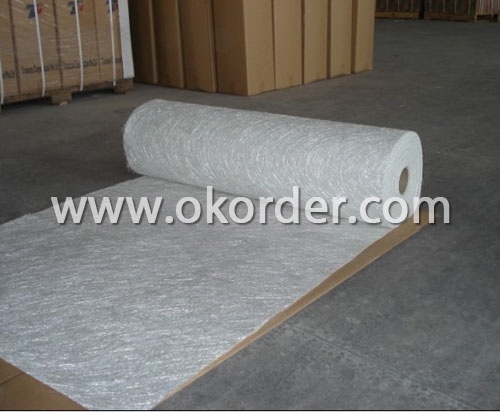
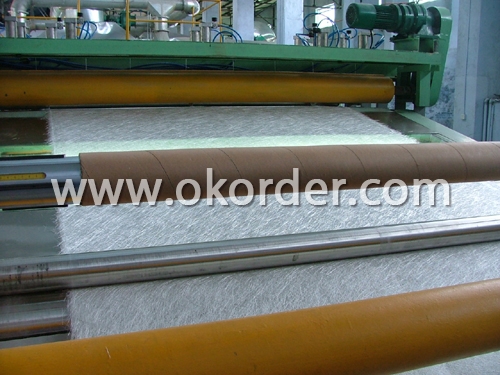
- Q: Does fiberglass mat tissue require any special handling precautions?
- Yes, fiberglass mat tissue does require special handling precautions. Due to its nature, fiberglass mat tissue can release tiny glass fibers into the air when handled incorrectly. These fibers can cause skin irritation, eye irritation, and respiratory issues if inhaled. Therefore, it is important to wear appropriate protective clothing, such as gloves, long-sleeved shirts, pants, and safety goggles, when handling fiberglass mat tissue. It is also advisable to work in a well-ventilated area or use respiratory protection if working in a confined space. Additionally, it is crucial to handle the material gently to avoid any breakage or damage that could release more fibers into the environment. Proper disposal methods should also be followed to prevent any potential harm. Overall, taking these precautions ensures the safety and well-being of individuals handling fiberglass mat tissue.
- Q: Can fiberglass mat tissue be used as a reinforcement in concrete?
- Yes, fiberglass mat tissue can be used as a reinforcement in concrete. It provides additional strength and durability to the concrete structure by improving crack resistance and reducing shrinkage.
- Q: Can fiberglass mat tissue be used for insulating concrete forms (ICFs)?
- Yes, fiberglass mat tissue can be used for insulating concrete forms (ICFs). Fiberglass mat tissue acts as a reinforcement layer that can be applied directly to the surface of ICFs. It helps to provide additional strength and durability to the concrete, while also enhancing the insulation properties of the ICF system. The fiberglass mat tissue is typically embedded in a thin layer of adhesive or mortar, which helps to bond it to the ICF surface. This combination of fiberglass mat tissue and adhesive or mortar creates a strong, insulated barrier that helps to minimize heat loss and improve energy efficiency in a building. Additionally, fiberglass mat tissue is lightweight and easy to handle, making it a convenient choice for ICF installations.
- Q: What is the moisture vapor transmission rate of fiberglass mat tissue?
- The moisture vapor transmission rate of fiberglass mat tissue is subject to variation based on factors like the material's specific composition and thickness. As a general rule, fiberglass mat tissue tends to exhibit a relatively low moisture vapor transmission rate. Its ability to facilitate the passage of moisture vapor is comparatively limited. Consequently, this attribute renders it suitable for applications where moisture resistance is sought, such as in insulation or construction materials. However, it is crucial to acknowledge that the moisture vapor transmission rate of fiberglass mat tissue can be additionally impacted by other variables, including the existence of coatings or laminations. These additional elements have the potential to enhance or restrict its moisture vapor transmission properties.
- Q: Can fiberglass mat tissue be used for insulation in cold climates?
- Yes, fiberglass mat tissue can be used for insulation in cold climates. It is a commonly used material for insulation due to its low thermal conductivity and ability to trap air, providing effective insulation against cold temperatures.
- Q: Does anyone know the hardness value of the heat conductive gasket? Does it contain the hardness of the carrier (glass fiber)?
- SHORE hardness is only for the hardness of the heat conductive gasket itself
- Q: What is the weight range of fiberglass mat tissue?
- The weight range of fiberglass mat tissue can vary depending on the specific product and its intended application. Generally, fiberglass mat tissue can range in weight from around 20 grams per square meter (gsm) to 100 gsm or more. Thinner and lighter fiberglass mat tissues are often used for applications such as insulation or as a reinforcing layer in composite materials, while heavier fiberglass mat tissues are typically used for more demanding applications such as roofing or flooring. It is important to note that the weight range can also be influenced by factors such as the type of resin used, the desired strength or stiffness of the final product, and any specific requirements or specifications for a particular project.
- Q: Can fiberglass mat tissue be used for insulating crawl spaces?
- Yes, fiberglass mat tissue can be used for insulating crawl spaces. Fiberglass mat tissue is a versatile and commonly used material for insulation purposes. It is lightweight, flexible, and easy to install, making it suitable for crawl spaces which often have limited access and tight corners. Fiberglass mat tissue is also resistant to moisture, mold, and pests, making it an ideal choice for crawl spaces which are prone to these issues. Additionally, it provides excellent thermal insulation properties, helping to maintain a consistent temperature and energy efficiency within the crawl space. Overall, fiberglass mat tissue is a reliable and effective option for insulating crawl spaces.
- Q: How does the width and length of fiberglass mat tissue affect its application?
- The width and length of fiberglass mat tissue can greatly affect its application in various ways. Firstly, the width of the mat tissue determines the coverage area and ease of installation. A wider mat tissue can cover a larger surface area, reducing the number of individual sheets required for a project. This can save time and effort during installation, especially for large-scale applications. Additionally, the width of the mat tissue can affect the overall strength and durability of the finished product. A wider mat tissue provides more reinforcement, making it suitable for applications that require greater strength and stability, such as in the construction of structural components or high-stress areas. On the other hand, the length of the mat tissue impacts the convenience and flexibility during application. Longer rolls of mat tissue allow for continuous installation without the need for frequent seams or joints. This is particularly advantageous when working on large projects, as it minimizes potential weak points and enhances the overall integrity of the fiberglass application. Moreover, the length of the mat tissue also affects the ease of handling and transportation. Longer rolls can be more challenging to maneuver and transport, especially in confined spaces or through narrow doorways. Therefore, the length should be considered based on the accessibility and logistics of the specific application site. In summary, the width and length of fiberglass mat tissue play crucial roles in its application. The width determines the coverage area, strength, and durability, while the length influences the convenience, flexibility, and handling during installation. Considering these factors allows for a more efficient and successful application of fiberglass mat tissue in various industries and projects.
- Q: How is fiberglass mat tissue different from fiberglass cloth?
- Fiberglass mat tissue and fiberglass cloth, despite being woven glass fiber materials, exhibit distinct dissimilarities. Fiberglass mat tissue, an unwoven substance, comprises glass fibers randomly arranged and held together by a binding agent. It predominantly serves as a reinforcement layer in composite materials like fiberglass reinforced plastic (FRP) and fiberglass reinforced concrete (FRC). The random fiber orientation enhances the composite structure's robustness and stability. Notably, fiberglass mat tissue finds widespread usage in applications necessitating strength and rigidity, such as boat hulls or automotive components. In contrast, fiberglass cloth, a woven material, is created by interlacing glass fibers in a specific pattern. It is commonly employed in situations where flexibility and conformability are essential, such as the construction of surfboards or within the aerospace industry. By allowing precise and controlled fiber placement, fiberglass cloth facilitates the production of intricate shapes and attains a superior level of detail in the final product. Ultimately, the primary disparity between fiberglass mat tissue and fiberglass cloth lies in their structural characteristics and intended applications. While fiberglass mat tissue offers strength and stability, fiberglass cloth provides flexibility and conformability. The selection between these materials hinges on the project's specific requirements and the desired outcome.
1. Manufacturer Overview
| Location | Zhejiang, China |
| Year Established | 1969 |
| Annual Output Value | Above US$ 150 Million |
| Main Markets | overseas companies in Hongkong, Canada, South Africa, South Korea, India, Italy, Singapore, France and many other countries and regions. |
| Company Certifications | ISO9001;ISO14001 |
2. Manufacturer Certificates
| a) Certification Name | |
| Range | |
| Reference | |
| Validity Period |
3. Manufacturer Capability
| a) Trade Capacity | |
| Nearest Port | Shanghai |
| Export Percentage | 40%-50% |
| No.of Employees in Trade Department | 21-50 People |
| Language Spoken: | English |
| b) Factory Information | |
| Factory Size: | Above 5000,000 square meters |
| No. of Production Lines | Above 5 |
| Contract Manufacturing | |
| Product Price Range | Average |
Send your message to us
Chopped Strand Mat Fiberglass Mat Tissue
- Loading Port:
- China Main Port
- Payment Terms:
- TT or LC
- Min Order Qty:
- 5Ton kg
- Supply Capability:
- 600TON PER MONTH kg/month
OKorder Service Pledge
OKorder Financial Service
Similar products
Hot products
Hot Searches
Related keywords
